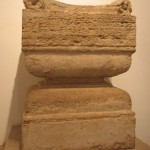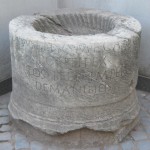
“When you sacrifice to the celestial Gods,” Numa said, “let it be with an odd number; when to the terrestrial, with even.”
Roman rituals are performed for a multiplicity of deities. There are three main categories of deities in our rituals – celestial Gods and Goddesses, terrestrial, and infernal. In performing ritual we have many differences to observe depending on which category of Gods are invoked. Never should a ritual invoke deities from different categories. The celestial deities are the ones you hear about most often in myth – Jupiter and Juno, Mercury, Venus, Minerva, and so on. Among the celestials, too, are the Lares, who are the spirits of humans who have spiritually evolved to take up a celestial abode near the Gods. The terrestrial Gods are found more often in legends than in myth. Many of these are lesser gods and these can include semi-divine denizens of the earth. Generally terrestrial deities relate to agriculture, forestry, husbandry, and other activities where we interact with Nature. A subcategory of terrestrial deities are those of the seas and oceans. Terrestrials would also include household deities, and those spirits of the dead who roam the earth, known as the lemures, as distinct from the Lares. Di inferni refer to our third category of deities, those of the Underworld. The Underworld is not what you may think. It is not a kind of Hell within the earth or below ground. Rather it refers to that portion of the sky below the celestial equator. Associated with the Underworld are matters concerning purification, health, and riches drawn from beneath the surface. Springs, especially sulfurous or hot springs with health benefits, are related to the Di inferni.
There is a fourth category as well, the Higher Gods, who we call the Involuti. They are also known as the “Shining Ones, “or the Aisai in the Oscan languages. Celestial Jupiter is called the Father of Gods and men. He is Rex over most other deities. However, “not even Jupiter may alter what the Fates have decreed.” Nor has Jupiter any authority over Fortuna, Nemesis, and similar Goddesses who act on behalf of the Involuti. Among the Involuti is a higher form of Jupiter who acts on a cosmic level, unlike the celestial Jupiter. There is likewise an infernal Jupiter who is known as Dis Pater “in His lowest capacity, when He is joined to the earth (Varro, L. L. 5.66).” Among the terrestrial deities, Hercules is said to be the genius of Jupiter; that is, Hercules is a terrestrial form of celestial Jupiter. There are multiple forms of many of the Goddesses and Gods of Rome – “so many Gods, and yet so few names by which to call Them,” as Cicero said, making Roman ritual complex at times. The Involtui are unknowable, and may only be inferred. Where we may consider these cosmic deities is in the mysteries, but generally not in Roman rituals.

Rites performed for the celestial Gods are to be conducted during daylight, under an open sky, preferably at dawn, when the Light of the Gods enters into the world once more. As such, prayers addressed to the celestial Gods are generally said while facing east towards the rising sun, although other orientations can be used since some deities are associated with specific directions or phenomenon. Rites to the infernal Gods are performed at night, or else beneath a canopy before dawn to shelter the rites from the view of celestial Gods. The west or northwest is generally associated with the infernal Gods, and one would face towards this direction during their rites. Rituals held to honor the terrestrial Gods are likewise conducted in daylight, but not always under an open sky. With terrestrial Gods one orients on Their location – towards a forest if forest deities, towards the sea or river, or towards mountains and hills, or wherever else may be appropriate.
Water used to purify a ritual space must be ritually pure. It must come from a source that flows freely in Nature and not through pipes. Spring water is preferred. Water gathered from nearby rivers in the four directions is used. Rain water collected in an already established templum can be used in ceremonies for that deity, the one for whom the sanctuary was established, but is otherwise not used for ceremonial purposes. On the other hand, ceremonies for the Di inferni use sulfurous water. Italy is a volcanic place with many hot springs, mineral springs, and vents emitting deadly fumes. Sometimes, though, the Romans would make substitutions. A pinch of sulfur may be added to stagnant water as a substitute, where it is referred to as water from “Lake Avernus itself” (Serv.Aen. 2.116).
The altars used for the celestial Gods are square, and the firewood placed upon the altar is set in a square form (molucum). For the infernal Gods, pits are dug first, and an altar or fire is then placed inside the pit. The altar and/or fire is round, the wood first stacked up to form a cone shape. For terrestrial deities a round altar is often used. Sometimes offerings are instead left for the terrestrial deities at places in nature. That is, flowers may be offered near or in rivers, spring fed ponds, and fountains, or else hung at places dedicated to terrestrial deities. Trees and rocks serve as altars in this case.

Roman prayer is conducted while using certain gestures. The gesture used when addressing the celestial Gods holds the right hand manus supina with the palm directed toward the sky. A different gesture is instead used when invoking celestial Gods and Goddesses to join us below. For terrestrial Gods and Goddesses the right hand is likewise held manus supina with the palm directed toward an earthly feature with which the deity is identified. The infernal deities are addressed using the right hand, only held manus prona. The palm faces down over an altar, or over a pit or chasm. The right hand is used when sacrificing an offering to celestial or terrestrial deities, but the left hand is used instead when offering to infernal deities (and the right hand is either placed on the earth or else held in a protective gesture). Sometimes a particular ritual will specify a gesture that is unique to it alone; those gestures reserved for infernal deities should never be used in ceremonies to honor the celestial and terrestrial Gods and Goddesses.
Arbores felices, or the “fortunate trees,” are used for celestial and terrestrial deities when making a fire. They could also be used for infernal deities when called upon to perform some benefit. Trees of purification are pine, juniper, and cypress. The unfortunate Arbores infelices are generally avoided in ritual use, but are used in some purification rituals when infernal deities are called upon to purge disease or evil.
Incense is offered to present a fragrance pleasing to the celestial Gods or else to purify a place. Exotic incense such as myrrh, frankincense, cinnamon, and nard are generally reserved for the celestial Gods. Foul scented sulfur is used for infernal deities, more often to ward off than to attract Them. Herbs of the earth are most commonly used for terrestrial deities. Some trees and herbs are more closely identified with certain deities over others. However it was more often the location from which the herbs came, rather than which herbs, that was important. As a general purpose incense, an offering of dried bay leaves begins every ceremony, offered to Janus and to Minerva, and bay laurel can always be offered to celestial and terrestrial Gods and Goddesses. But bay, and olive leaves, are not used for infernal deities, especially in purification rituals.

In general, milk is the preferred libation to use for terrestrial and infernal deities, while wine is most often offered for celestial Gods. Milk is generally offered to a celestial Goddess, sometimes with honey or mint mixed in, and wine is only offered in exceptional cases. However, wine is the libation offered to Venus and to the Capitoline Juno, even though milk would be offered to other Junones. Libations to the celestial Gods are burned on the altar to release their inner essence, while libations to infernal deities are poured into pits or chasms. Libations for terrestrial deities are poured into rivers, lakes, fountains, ponds and the sea, or else onto the earth, and quite often over a large stone. But then in one place wine was customarily poured on a table set for Juno. What governs which drink to offer as a libation depends more on the cultus established at a sanctuary for the particular deity. Water is offered not as a libation but for cleansing the hands and thus set out in bowls. Olive oil and honey are common offerings, and although not considered as libations, they may be offered in the same way. Olive oil is also burnt in oil lamps as an offering, especially when offered for the dead.
Of course there is also the instruction from Numa Pompilius by which I began. Offerings are brought around an altar a minimum of three times before sacrificing to the flames; four times are they presented to the cardinal directions if intended for terrestrial deities. If offering flour or grain to a celestial Goddess or God, then it is laid out in three lines. An apple may be quartered for a minor terrestrial god, while a celestial Goddess might be offered three apples. For a celestial God, an extra offering of incense might be given in a set of three amounts, or twice each time to a minor terrestrial goddess. For infernal deities, procedures are different and offerings may be mixed together to form one sacrifice.
Again, these comments are only a general guide. There are always exceptions. You would have to travel through India, Japan, or Southeast Asia to find the same kind of diversity as Roman traditions hold. Those who are new to the practice of the Religio Romana are encouraged to first set up a lararium in their home and establish a cultus for their ancestors. As they learn more they may then begin to erect altars for the Goddesses and Gods with whom they share their lives.
Di Deaeque te bene ament. May the Gods and Goddesses kindly love you.















